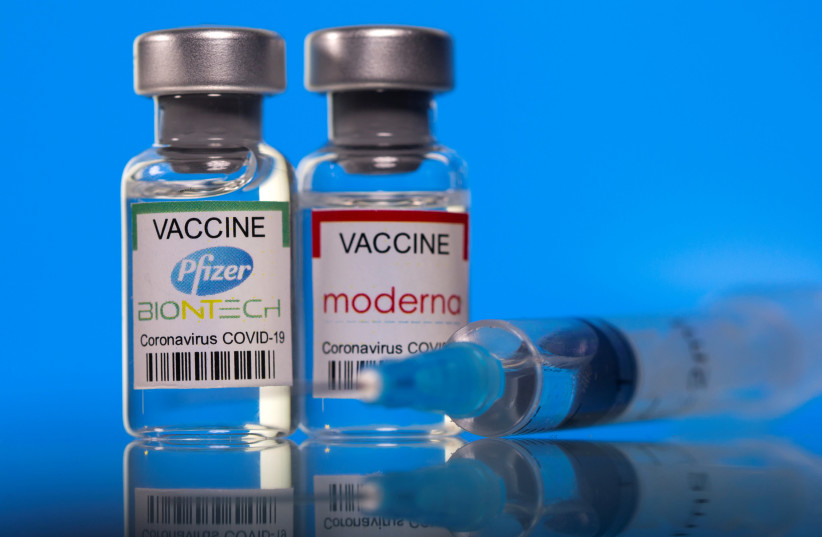The novel coronavirus SARS-CoV-2, which causes COVID-19, has ravaged the world for over two years, but the development of vaccines has significantly helped curb its spread. But with so many COVID-19 vaccines out there, the question stands: Which should you take, especially which booster?
That is exactly what this academic study sought to answer, with the overall conclusion being that mRNA vaccines like Pfizer's seem to be the best.
The findings of this study were published in the peer-reviewed academic journal JAMA Network Open.
The study sheds light on the efficacies of different types of coronavirus vaccines, which is more effective, and which you should get.

Coronavirus vaccines: Take a shot for your health
Since the pandemic first emerged, the race was on to develop an effective vaccine to combat COVID-19. These were developed rapidly and the result was nothing short of an absolute triumph for science.
Indeed, their effectiveness was swiftly proven and the result has seen a massive improvement in people around the world trying to stem the ongoing spread of the virus.
Overall, there were several types of vaccines, but for the purpose of this study, they will be roughly divided into two categories: mRNA vaccines and inactivated vaccines.
The first category, mRNA vaccines were the first to really hit the general public, being developed by companies like Pfizer-BioNTech, which developed BNT162b2, and Moderna, which developed mRNA-1273.
As their name implies, mRNA vaccines utilize mRNA, also known as messenger RNA. This molecule is used to induce an immune response in the body.
Essentially, the mRNA in question is made in a laboratory and functions by essentially teaching the body's immune system how to react to certain pathogens that enter the body. This, in turn, makes antibodies, which keeps us from being infected by the pathogen in question.
The second type of vaccine, the inactivated kind, is rather different. Rather than including mRNA to teach the body to protect itself from pathogens, this contains parts of the virus itself, albeit ones destroyed to the point where they won't be able to cause an infection but can still produce a response.
An example of this would be CoronaVac, produced by Sinovac Biotech.
It should be noted that while the potential uses of mRNA have been studied by scientists for decades, the COVID-19 vaccines are its first major debut.
Meanwhile, inactivated vaccines have significant precedence, with the vaccines for the seasonal flu and hepatitis A both being inactivated vaccines.
Having said that, there is more to this than just category, as there is also another factor to consider: Booster shots.
Essentially, additional shots will be needed in order to shore up the immunization.
This has already been seen in several countries all over the world, such as Israel, where three mRNA vaccine shots were administered.
But here comes the efficacy question. Specifically, which is more effective?
This is where the study comes in.
<br>The Malaysia question: Pfizer or Sinovac
Malaysia is a southeast Asian country of over 30 million people. Here, as is the case in most places, a widespread vaccination rollout has already taken place, as has a booster rollout.
It is estimated that, by February 6, 2022, over 50% of the country's adults received the booster shots.
But there is a difference when it came to the type of vaccines used.
During the initial rollout, which saw over 95% of the country's adults get vaccinated, both Sinovac's CoronaVac and Pfizer's BNT162b2 were used.
After that, the booster program was rolled out that also included both vaccines, though at different times.
Those vaccinated with the Pfizer COVID-19 vaccine had to wait six months, while those vaccinated with Sinovac had to wait three.
Here lies the question: Which was more effective?
That was what the researchers sought to answer. This was done by analyzing data from Malaysia's national COVID-19 surveillance system, essentially covering records of almost 14 million people. People who had received other vaccines that weren't Sinovac of Pfizer were excluded, as were those who had contracted COVID-19 earlier.
In the end, there were roughly five categories: Those who received just two Pfizer shots (5.7 million), those who received two Sinovac shots (3 million), those who received three Pfizer shots (1.26 million), those who received two Sinovac shots and one Pfizer shot (3.2 million) and those who received three Sinovac shots (590,777).
Vaccine wars: Pfizer is king
Overall, the results concluded a few things.
Firstly, getting a booster was shown to boost resistance against symptomatic COVID-19 infection. This was true across the board, regardless of which vaccines were used.
But overall, the Pfizer vaccine was shown to be associated with better rate of developing symptomatic COVID-19.
This is supported by prior studies done, which also indicated the stronger effectiveness of Pfizer as opposed to Sinovac.
So in conclusion: COVID-19 vaccines absolutely do work, and getting booster shots are also shown to offer an even stronger defense against infection.
But overall, as far as this study and several others seem to be concerned, it seems that Pfizer provides a stronger protection against COVID-19 than Sinovac.
And the implications behind this go beyond simple semantics over which brand to endorse.
Pfizer is very much widespread in the West, being one of the most dominant and widespread forms of COVID-19 vaccines that are available in several countries such as Israel and the United States.
However, Sinovac is widely used in low- and middle-income countries around the world. This is due to a number of factors and some other advantages that this type of vaccine possesses, chief among them being how easy it is to store and transport it compared to Pfizer's vaccine. This, in turn, makes Sinovac a far more attractive vaccination option for low-resource settings.
But given the study's findings, it is important to find a way to offer the level of protection granted by Pfizer to these low-resource environments.
